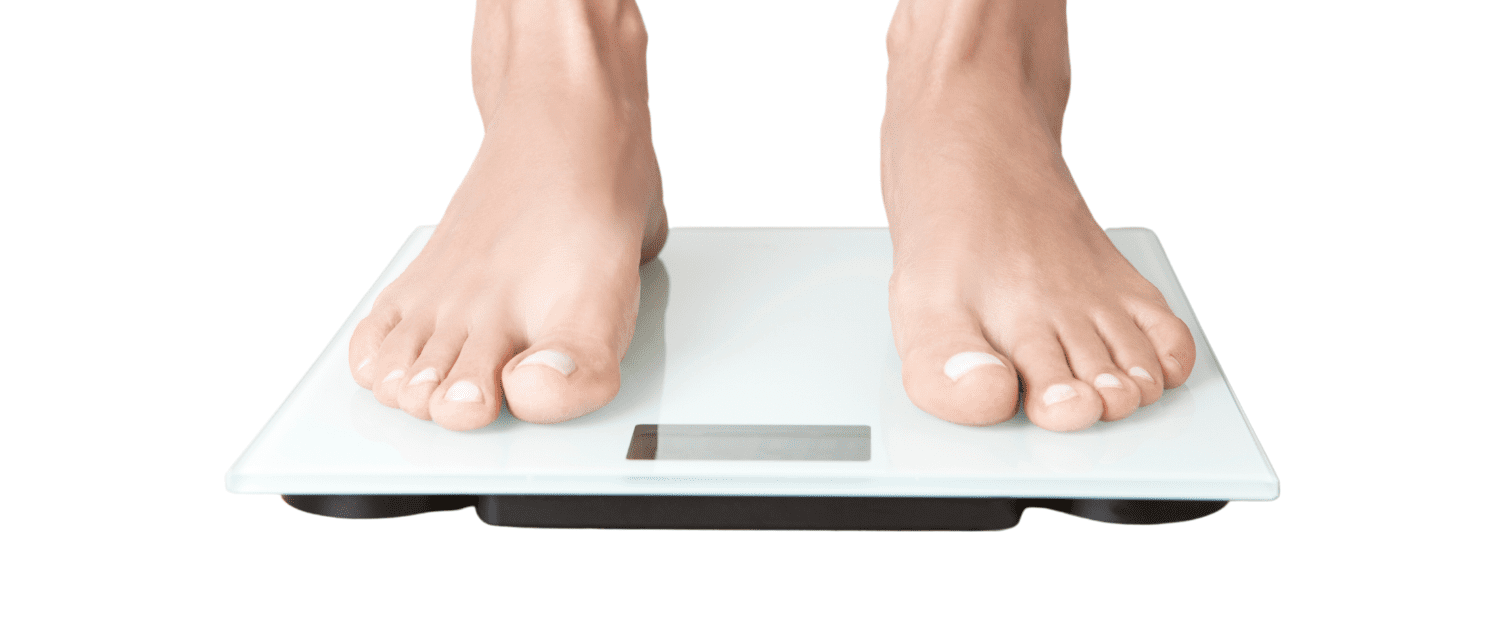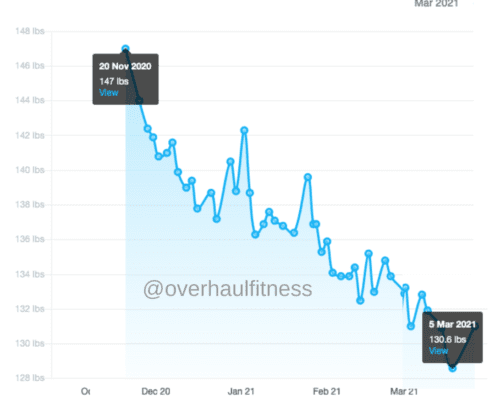8 Reasons The Scale Didn’t Move When You Thought It Should
May 15, 2021 by Jackie Lindal
Read time: 6 minutes
Scale fluctuations can be frustrating when you’re trying to lose weight. Even though you might be doing everything right as far as nutrition and exercise are concerned, sometimes the scale can suddenly spike for no apparent reason.
Most people think that a sudden spike on the scale means they’ve immediately gained body fat, or they’ve ruined their progress, but that isn’t usually the case. Scale fluctuations may be due to multiple reasons that have nothing to do with fat gain.
Here are 8 reasons why the scale might not be changing the way you anticipated it would, despite forward progress with your nutrition and exercise:
1. You Consumed More Salt Than Usual
Salt is used in food as both a taste enhancer and a preservative. More commonly understood as sodium on nutritional labels, (salt = sodium + chloride), your sodium intake will be higher if you consume processed, preserved, or ready-to-eat food options. You’ll also likely consume higher amounts if you eat out at a restaurant. With increased sodium intake comes fluid retention. Therefore, when your sodium intake is high, your weight on the scale will appear higher than your true weight. If you keep the calories in check, your true weight won’t go up. To have your “scale weight” match your true weight, consider decreasing your sodium intake so your fluid balance can return to normal.
2. You Slept Poorly
Poor sleep can have a big impact on your weight loss results as well as an impact on scale fluctuations. If you have a bad night’s sleep, you might notice your weight jump the following morning. When we don’t get enough sleep, our body activates a stress reaction that can impact our metabolism, digestion, and water retention, which may make the scale go up (see point 3 for a further explanation).
Bad sleep also leaves us tired and unmotivated, which makes us less likely to want to make good food choices and get some exercise. We may seek out comfort food or eat out of convenience because we are tired; this can make the scale number jump due to extra water retention. Aim to get 7-9 hours of good quality sleep a night. If you have a bad night of sleep, do your best to get back on track to your regular sleep schedule the following night. You aren’t going to nail it every night, but try to focus on the daily average of 7-9 over the course of the week.
3. You’re Stressed (outside of poor sleep)
Stress has a lot to do with not only sleep issues, but also our overall metabolism and how we are feeling. Our eating habits change while we are stressed: many people overeat or make poor food choices out of convenience or comfort. When we are stressed, our workouts are also likely to get pushed to the side, which results in us being less active than usual. Lastly, stress has a huge impact on our hormones. Cortisol is a hormone that increases when we are stressed. It is involved in multiple systems in our body including inflammation, water retention, insulin sensitivity, blood sugar levels and more. When you are stressed, your levels of Cortisol increase, which can then lead to excess water retention and inflammation – causing the scale to go up (1, 2).
4. You Just Started Working Out / You Had an Intense Workout
When you’re new to training or when you have a more intense workout than usual, it’s common for you to maintain your weight (despite thinking you should have lost weight). There are 2 main reasons for this:
- When you workout, you create micro-tears in your muscles. As part of the normal recovery process for these micro-tears, an inflammation response happens that can cause extra water retention in the muscles. Most people experience this inflammation as muscle soreness, and is more commonly called Delayed Onset Muscle Soreness (DOMS) (3).
- A scale increase can also happen when you start exercising after an extended period of not working out. During this time, your muscles are adapting to the stress you’re giving them by building up sugar stores known as glycogen. Think of glycogen as stockpiled energy reserves of carbohydrates for your muscles to use later. Your body will create larger reserves based on how much you challenge them (4). A big component of glycogen is water; so, with more glycogen comes more water retention. This is the reason why people who follow a Keto diet lose so much weight initially (keyword: initially). They lose all of their glycogen stores as they deprive themselves of carbohydrates.
5. You Ate More Carbs Than Usual
After eating a big pasta / garlic bread dinner you may notice your weight spike the next day. Is this because carbs make your body gain fat? If your daily caloric intake didn’t change, then no. However, a big serving of carbs can cause you to retain a little more water as your body might store some carbs as muscle glycogen to be used later on for fuel.
- Side note: for every 1g of glycogen you store, you’ll also store 4g of water (5).
6. Inconsistent Weigh-Ins.
If you’re weighing yourself at different times of the day or even different days of the week, you may not be seeing your true weight. If you weigh yourself later in the day, after you’ve been eating or drinking, your weight will reflect the food and water in your body that you’ve been having all day. The same thing goes for weighing in on different days. If you weigh in on Monday after a weekend of treats, you may notice the scale is up more versus Thursday when you’ve been on track all week.
The best thing you can do is pick specific days and times to weigh in and keep it consistent. The ideal weigh-in time is shortly after you wake up in the morning, after using the washroom, and before eating or drinking anything. Also, consider weighing yourself more often than once or twice a week. Click here to read why.
7. Your Hormones
A woman’s menstrual cycle can play a significant role in scale fluctuations. Due to hormonal changes, it’s common to see the scale increase after the ovulation phase. We recently wrote a full blog on what to expect during your menstrual cycle and how scale fluctuations are impacted. Click here to read more about that.
8. Your Digestion Is Off.
Yes, as crazy as it sounds, if you’re constipated or just not as regular as usual, it can cause your weight to increase – or at least not drop like you thought it should have. To be blunt, sometimes you just need a good poop. To help with this, make sure you’re drinking plenty of water and eating more fibre rich foods (oatmeal, bran, vegetables) to help get back on track!
Takeaway message
Not all scale fluctuations are due to weight gain. If it’s a sudden change in weight over one or two days, it’s usually due to another reason unrelated to fat gain. The best thing you can do is stay on track and understand that scale fluctuations are normal.






